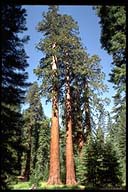History of the
Regional Parks Association
Founding Director
Emanuel Fritz
1886-1988
Professor Emeritus of Forestry, UC Berkeley
“Mr. Redwood”
 Emanuel Fritz, 102, Professor Emeritus of Forestry, died in his Berkeley home on December 15, 1988. Born in Baltimore, Maryland, he graduated from Cornell in mechanical engineering in 1908 and taught engineering at Baltimore Polytechnic Institute until 1912. He then turned to forestry as a profession and earned a master of forestry degree from Yale University in 1914.
Emanuel Fritz, 102, Professor Emeritus of Forestry, died in his Berkeley home on December 15, 1988. Born in Baltimore, Maryland, he graduated from Cornell in mechanical engineering in 1908 and taught engineering at Baltimore Polytechnic Institute until 1912. He then turned to forestry as a profession and earned a master of forestry degree from Yale University in 1914.
After working in state forestry in New Hampshire, he joined the U.S. Forest Service in 1915, working first in Montana and then in Arizona. During World War I he served in the army in France with responsibilities for aircraft maintenance, rising to the rank of captain. In 1919 he joined the UC faculty at Berkeley as Assistant Professor of Forestry. For most of the following seven decades he was a major figure in California forestry.
He played a central role in the development of the summer field courses in Plumas County as the keystone of the undergraduate forestry program at Berkeley. He was editor of the Journal of Forestry in the early 1930s and served as a member of the Council for the Society of American Foresters. That society elected him to the honorary grade of Fellow in 1951 and, in 1971, honored him further with the award of its Gifford Pinchot Medal. As a consultant to a legislative interim committee in 1943-45 he was a prime mover in the strengthening of state forestry in California and the initiation of state regulation of forest practices. For many years he served both as consultant to the California Redwood Association and councilor to the Save-the-Redwoods League. He was the founder of the Redwood Region Logging Conference and served as its manager for 22 years. He was active in developing support for the establishment of the forestry program at Humboldt State University. Above all, however, he focused on the forests of the North Coast of California and the development of redwood forestry.
Although Fritz could be highly effective in working with others when he wished, he was fiercely independent and essentially a loner. This was certainly true within the University, where he worked vigorously on what he believed to be important, with nearly a total disregard for the concerns of promotion committees and similar matters. It was not until 1950 that he was promoted from Associate Professor to Professor of Forestry, although by then he had been recognized internationally for many years as the leading authority on redwood forestry.
In his research and field studies Fritz relied primarily on informed observation. He was an exceptionally keen and detailed observer, with the knowledge and ability to interpret what he saw. His concern was with the development of knowledge that was needed when it was needed, not with the demonstration of more refined research methods. Similarly in publishing his findings he was far more concerned with getting his findings to those who were taking actions in the forests than in scoring points through formal publication in refereed journals. In any case, through his work he built the foundations of our present understanding of redwood forestry.
Most of all Emanuel Fritz was a teacher — a teacher not in some limited professional sense but on a universal scale. As a classroom teacher he often gave perfunctory examinations and sometimes missed his classes, but he more than made up for this when he was present. In an era in which most forestry students looked forward to careers in the Forest Service or other public agencies, Fritz gave encouragement and strong support to those who turned to private industry. He had a primary role in the development of the interpretive programs of the redwood state parks. And he had a special talent for and interest in the education of those who owned or worked on the forest lands of the North Coast. He was an active and devoted member of the Bohemian Club and participated regularly in the Club’s encampments, but he deliberately and knowingly used the Club as a means for educating some of the most powerful and influential people of the state and the nation about redwoods and forestry. He was also a member of the Commonwealth Club of San Francisco, serving on its Board of Governors, Forest and Recreation Section and its Research Committee.
In 1954 Fritz retired officially as Professor Emeritus, but in fact he remained active in redwood forestry for many more years. He was a member of the forestry faculty for 70 of the 75 years of forestry education at Berkeley. He is survived by his daughters, Roberta Fair of Eugene, Oregon, and Barbara Fritz who lived in the family home in Berkeley. At the time of his death he was the oldest professor in the history of the University of California which is no small measure a tribute to his determination combined with the skillful and loving care of his daughter.
J. A. Zivnuska
H. J. Vaux
R. A. Cockrell
This biography was adapted from the In Memoriam collection at the University of California Berkeley website: http://www.berkeley.edu/
